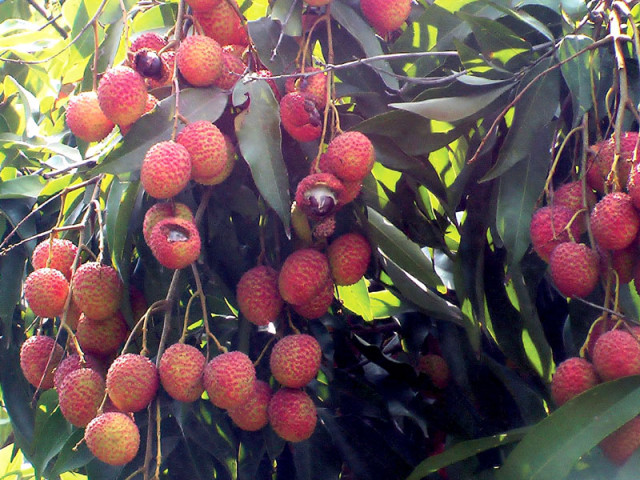In the ‘food basket of Khanpur’, a tough season for Lychee
Growers face triple whammy of hot weather, water scarcity and pests.

At the mercy of hot weather and water scarcity, the most sought after seasonal fruit, lychee, is rotting away in Khanpur valley. The damaged crop has caused considerable loss to the farmers, who have no option but to sell the fruit at lower rates.
A visit to the Panjkatha locality, touted as “the food basket of Khanpur”, revealed that the fruit on a majority of the trees has been damaged, and as a result, the market rate of the fruit has also dropped.
Sarfraz, a local farmer, said there was a bumper crop of lychee this season and the farmers were expecting to earn large profit. However, he said that 70% of the crop has been destroyed due to the water shortage, whereas 30% is “relatively better” of which 10% has “blackened and lost flavour”.
Sarfraz said the farmers are picking and selling the damaged fruit for as low as Rs25 to Rs30 per 5kg. He added that if they only pick the damaged fruit and not the entire bunch, it could harm other fruit.
Fiaz, another farmer said that a crate weighing 10kg is being sold for Rs1,000 to Rs1,200, whereas last year’s rate was Rs1,500 to Rs1,600. He said that the farmers who were to sell their fruit for Rs100,000 would now earn only Rs25,000 from it, “which is a huge loss”. He explained that with the returns, the farmers will be unable to meet the cost of labour, pesticides and insecticides which they spent on their orchards.
Bats are another threat to the crop, he said, adding that the flying mammals attack the lychee orchards in flocks. Raja Gul Khan, another farmer, said that a lychee orchard needs to be watered weekly or at least twice a month. However this time around, their orchards remained dry for two months in a row, proving “disastrous” for the crop.
Another farmer, Fiaz, accused Khanpur Dam authorities of supplying them less water for irrigation. He said that under an agreement with the Khanpur dam authorities, farmers of Panjkatha are entitled to receiving 56 cusecs of water daily from the dam. However, he claimed they received very less water during the season. He said that the citrus orchards have also been badly affected by the ongoing dry spell and short supply of water.
When approached, an official source at the local irrigation department confirmed that the Panjkatha area received less water owing to a decrease in Khanpur dam’s water table. He added that the dam authorities were supposed to address the municipal needs first with a preference on the irrigation supplies.
Lychee, which is of Chinese origin, has four verities grown in Khanpur, namely Gola, Surahi, Bedana and China, which due to their distinct taste and size cost more than the varieties grown in Punjab.
According to the crop reporting centre, Haripur has 1,294 acres of fruit orchards and its total annual produce of all fruits is 1,900 tonnes. Orange, loquat, apricots, guava and lychee are the most commonly grown fruits, which farmers transport down country to earn higher profits. Lychee orchards alone are spread over 2,500 to 3,000 kanals (100 acres).
Published in The Express Tribune, July 24th, 2012.
Correction: In an earlier version of the story, figures regarding crops were misstated. The error has been rectified.













COMMENTS
Comments are moderated and generally will be posted if they are on-topic and not abusive.
For more information, please see our Comments FAQ